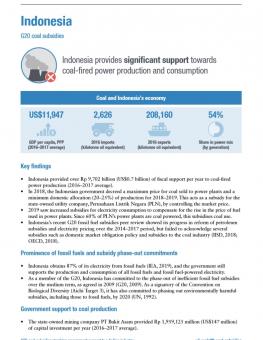
G20 Coal Subsidies: Indonesia
This country study and accompanying data sheet compile publicly available information on G20 subsidies to the production and consumption of coal (including coal-fired power) in Indonesia in 2016 and 2017.
Indonesia provides significant support to coal-fired power production and consumption.
This country study and accompanying data sheet compile publicly available information on G20 subsidies to the production and consumption of coal (including coal-fired power) in Indonesia in 2016 and 2017. It is a background paper to the report G20 Coal Subsidies: Tracking Government Support to a Fading Industry and provides a baseline to track progress on the phase-out of such subsidies as part of a wider global energy transition.
Participating experts
You might also be interested in
Switching Fossil Fuel Subsidies in Indonesia to Support a Green Recovery
This brief looks at how Indonesia can start actively promoting renewable energy by removing the existing hurdles to its deployment—such as unattractive renewable energy feed-in tariffs and land and infrastructures barriers—and switching public support from fossil fuels to renewables to meet the country’s clean energy targets.
Indonesia's fiscal support for fossil fuels too large: IISD
The Indonesian government's fiscal support for fossil fuels is still too large, so it has the potential to slow down the energy transition and drain the public budget, according to the International Institute for Sustainable Development (IISD).
How Indonesia's Incoming President Can Advance the Transition to Clean Energy
With Prabowo Subianto inaugurated as Indonesia’s President, speculation abounds about the new administration’s commitment to the clean energy transition and climate targets, given Prabowo’s positioning as the “continuity candidate.” The question is, what, exactly, will be continued?
At long last, Canada restricts oil and gas subsidies (except for all the loopholes)
Environment and Climate Minister Steven Guilbeault has unveiled detailed plans to phase out "inefficient" oil and gas subsidies, based on guidelines released yesterday morning that take effect immediately and are meant to fulfill a 14-year-old pledge by G20 countries.